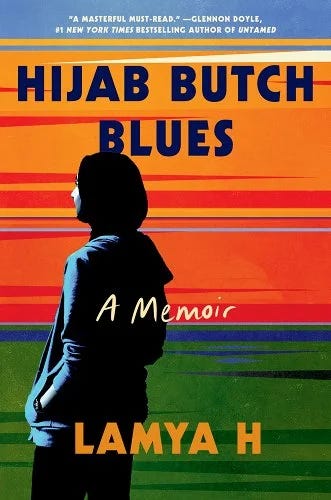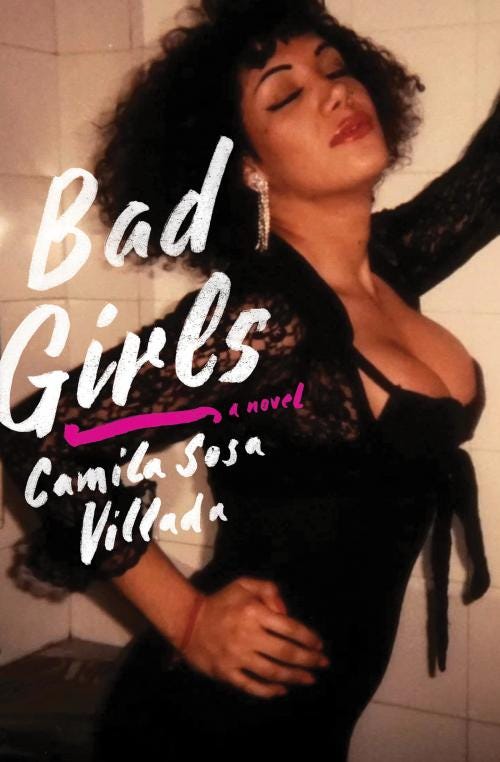Hello there, beautiful people.
It is I. That someone you know who, after artistic inspiration, must recommend said art to any and all family, friends, and kind strangers. Well, here we meet again so that I may share a few of my favorite things from these past few weeks.
The first-ever installment dropped not too long ago, in case you missed it (real good stuff in there, if I do say so myself).
This week? We’ve got a bit of funk, a lil’ RnB, and some meaty themes, friends. I’m talking anonymous memoirs about butch-y Muslim folk, docs about Afghani refugees, and a magical realist tale about a family of lovely trans femmes.
Now let’s not waste no more time…
A Few of My Favorite Things From the Last Few Weeks: VOLUME 2
Cinema
Flee (2021)
FLEE is the incredibly true story of Amin, who, in his youth, was uprooted from Afghanistan with his mother and siblings.
The documentary dips in and out of graphic-novel-styled animation into real archived footage from many of the historic events intertwined through Amin’s harrowing childhood.
Amin decided to share his story as long as he could stay anonymous (hence animation), driven by his present life in Denmark with his fiancée to finally face the many ways his past still affects him.
FLEE is an award-winning work. If you watch it, you won’t be surprised. But it was the heart infused all up and through this film that left me almost teary towards the end.
It's a story of overcoming childhood trauma, discovering the truth and importance of family, and accepting one's sexuality. But it’s also a story of xenophobia and the many life-long trials refugees face amid war and globalization. All as they simply try and find peace in their everyday lives.
Music
“Strawberry Letter 23” by Shuggie Otis
Many of you may be familiar with The Brothers Johnsons’ “Strawberry Letter 23.”
But you may not know that their version of this 1977 hit is in fact a cover, first written and performed by phenomenal guitar player, multi-instrumentalist and singer Shuggie Otis.
Shuggie Otis recorded “Strawberry Letter 23” on his second album, Freedom Flight (1971) as a teenager. A teen! The song got its name as a reply to Otis’ then-lover, whose previous letter he called "Strawberry Letter 22."
When I first stumbled on that Freedom Flight’s album cover years ago, with its minimalist mauve background matching Otis’ deep pink lips, closed with a stoic gaze under a wispy little mustache. With that gorgeous, fluffy fro?! I truly thought I’d discovered a retro-loving, modern-day indie artist.
No shade! I fuck with the Steve Lacy’s of the world. But no, Shuggie Otis is the blueprint. And he’s still going strong today with his most recent album, Inter-Fusion, released in 2018.
I revisited him randomly this past week. Remembered just how much I lose my mind with how his laid-back tenor compliments that easy breezy funk guitar he does so well.
Highly recommend checking out all of Otis’ discography. But if this is your first introduction, here’s his version of “Strawberry Letter 23”:
Love, Daddy Princess - TimaLikesMusic
R&B ain’t dead, y’all. Love, Daddy Princess is a Black as hell, queer as hell love letter to 1990s rhythm and blues a la Babyface and Teddy Riley, Jimmy Jam and Terry Lewis—the hit makers.
TimaLikesMusic, a Black lesbian producer, musician, and artist out of Brooklyn, NY, is the brainchild behind this fun new EP, featuring many of her friends and other lesser-known artists.
I’ve looped Love, Daddy Princess at least a dozen times, no joke. In my defense, its barely over 15 minutes long. Enjoy!
Books
Hijab Butch Blues by Layma H.
This book has been on my list since I first learned about it this past February. I’d been on a memoir tip for over a year, and so instead of buying it, I joined a very long Libby waitlist in hopes I’d have the space for one more by then. I did. I’m so grateful I did.
The author, Layma H.’s (she/they), writing is direct and clear. But Hijab Butch Blues is complicated. Challenging. The sort of challenge that, when completed, makes you a better you.
Layma does not tell us why Islam matters to her as a brown queer person. They don’t explain (at least not explicitly) why they still wear hijab now, even when some of their own family don’t agree with it. No. They show us.
Within the shape of their entire story, they show us. Stories of Profits stand beside their own like family. Islamic teachings guide and follow Layma’s life experiences, reverberating. Back and forth, intertwined. One.
Layma calls the profit Maryam a dyke. They reject Allah as ‘He’ or even ‘She,’ as some progressive thinking advises, and instead embrace Them as outside of any sort of binary at all. Hijab Butch Blues then becomes an inseparable story of queerness within, and of, Islam. Islam as queer.
I cannot lie. I found myself upset several times while reading this book. I’d grow frustrated at times with Layma’s naiveté about this world we live in. At times, annoyed with what felt like unnecessary kindness or cowardice in the face of adversity. Mad about the some of the ways she holds fast to old tradition in the name of faith. Or in what I saw as stiffness or prudishness, even. I was forced to ask myself questions of my own biases. To rethink some of my own views, of which I’m still contemplating, and for that I’m so thankful.
Layma’s story is one of bravery, a kind we don’t often celebrate. A kind rooted in faith and love that is resilient even when most feel it shouldn’t be.
I cherished learning so much about Islam in a way that felt intimate. Even the anonymity of Layma’s story, excluding her home country and exact age, added a sort universality to this story that truly emphasized how revolutionary Hijab Butch Blues really is. In case it isn’t obvious, yes this book is worth a read. Maybe even two.
Bad Girls by Camila Sosa Villada
Camila Sosa Villada is an Argentine writer and actress whose award-winning work is typically written in Spanish.
Her first novel, translated by Kit Maude, is a gritty though magical autofiction1 centered around the life of a chosen family of ‘travestis’2 in the small Argentine town of Mina Clavero, headed by a 178-year-old eternal named Auntie Encarna.
It is like nothing I’ve ever read. Fantastical and dark and otherworldly. So uncomfortably familiar. With headless gentlemen as allies and werewomen treated as lowly as dogs, Villada’s chronicles a magically realistic story of the injustices travestis continue to face.
Welp! That’s all for now, friends!
Can’t wait to share more but in the meantime, I’m always looking for more recs. Feel free to share below!
Autofiction is a literary genre that mixes fictitious information, characters, and events with autobiography.
The term “travestis” is used in Latin American countries to describe those assigned male at birth who later identify more with femininity or as women or femmes. Other words have been created and used around South America over the years in an effort to set the term apart from cross-dressing, drag, or offensive connotations.







Strawberry Letter 23 is one of my absolute favorite tracks of all time. When I first heard it in Boogie Nights I fell in love...